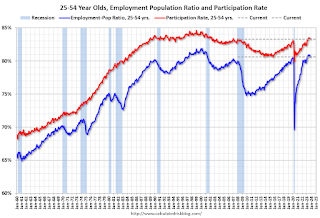Leisure and hospitality gained 19 thousand jobs in October. At the beginning of the pandemic, in March and April of 2020, leisure and hospitality lost 8.2 million jobs, and are now down 223 thousand jobs since February 2020. So, leisure and hospitality has now added back about 97% all of the jobs lost in March and April 2020.
Construction employment increased 23 thousand and is now 425 thousand above the pre-pandemic level.
Manufacturing employment decreased 35 thousand jobs and is now 175 thousand above the pre-pandemic level.
In October, the year-over-year employment change was 2.97 million jobs.
Seasonal Retail Hiring
Typically, retail companies start hiring for the holiday season in October, and really increase hiring in November. Here is a graph that shows the historical net retail jobs added for October, November and December by year.
 This graph really shows the collapse in retail hiring in 2008. Since then, seasonal hiring had increased back close to more normal levels. Note: I expect the long-term trend will be down with more and more internet holiday shopping.
This graph really shows the collapse in retail hiring in 2008. Since then, seasonal hiring had increased back close to more normal levels. Note: I expect the long-term trend will be down with more and more internet holiday shopping.Retailers hired 148 thousand workers Not Seasonally Adjusted (NSA) net in October. This was about the same as last year and suggests similar real retail sales this holiday season as last year.
This was seasonally adjusted (SA) to a gain of 1 thousand jobs in October.
Prime (25 to 54 Years Old) Participation
 Since the overall participation rate is impacted by both cyclical (recession) and demographic (aging population, younger people staying in school) reasons, here is the employment-population ratio for the key working age group: 25 to 54 years old.
Since the overall participation rate is impacted by both cyclical (recession) and demographic (aging population, younger people staying in school) reasons, here is the employment-population ratio for the key working age group: 25 to 54 years old.The 25 to 54 participation rate decreased in October to 83.3% from 83.5% in September, and the 25 to 54 employment population ratio declined to 80.6% from 80.8% the previous month.
Both are close to the pre-pandemic levels.
Average Hourly Wages
 The graph shows the nominal year-over-year change in "Average Hourly Earnings" for all private employees from the Current Employment Statistics (CES).
The graph shows the nominal year-over-year change in "Average Hourly Earnings" for all private employees from the Current Employment Statistics (CES).
Average Hourly Wages
 The graph shows the nominal year-over-year change in "Average Hourly Earnings" for all private employees from the Current Employment Statistics (CES).
The graph shows the nominal year-over-year change in "Average Hourly Earnings" for all private employees from the Current Employment Statistics (CES). There was a huge increase at the beginning of the pandemic as lower paid employees were let go, and then the pandemic related spike reversed a year later.
Wage growth has trended down after peaking at 5.9% YoY in March 2022 and was at 4.1% YoY in October.
Wage growth has trended down after peaking at 5.9% YoY in March 2022 and was at 4.1% YoY in October.
On an annualized basis, wages increased 2.5% in October. Since wages increased sharply last November and December, it is likely YoY wage growth will slow further over the next couple of months.
Part Time for Economic Reasons
 From the BLS report:
From the BLS report:"The number of persons employed part time for economic reasons, at 4.3 million, changed little in October. These individuals, who would have preferred full-time employment, were working part time because their hours had been reduced or they were unable to find full-time jobs."The number of persons working part time for economic reasons increased in October to 4.28 million from 4.07 million in September. This is below pre-recession levels.
These workers are included in the alternate measure of labor underutilization (U-6) that increased to 7.2% from 7.0% in the previous month. This is down from the record high in April 22.9% and up from the lowest level on record (seasonally adjusted) in December 2022 (6.5%). (This series started in 1994). This measure is above the 7.0% level in February 2020 (pre-pandemic).
Unemployed over 26 Weeks
 This graph shows the number of workers unemployed for 27 weeks or more.
This graph shows the number of workers unemployed for 27 weeks or more. According to the BLS, there are 1.282 million workers who have been unemployed for more than 26 weeks and still want a job, up from 1.216 million the previous month.
This is above the pre-pandemic levels.
Job Streak
Through October 2023, the employment report indicated positive job growth for 34 consecutive months, putting the current streak in 5th place of the longest job streaks in US history (since 1939).
| Headline Jobs, Top 10 Streaks | ||
|---|---|---|
| Year Ended | Streak, Months | |
| 1 | 2019 | 100 |
| 2 | 1990 | 48 |
| 3 | 2007 | 46 |
| 4 | 1979 | 45 |
| 5 | 20231 | 34 |
| 6 tie | 1943 | 33 |
| 6 tie | 1986 | 33 |
| 6 tie | 2000 | 33 |
| 9 | 1967 | 29 |
| 10 | 1995 | 25 |
| 1Currrent Streak | ||
Summary:
The headline monthly jobs number was below consensus expectations and employment for the previous two months was revised down by 101,000, combined. The participation rate and the employment population ratio both decreased, and the unemployment rate increased to 3.9%.
This was a weaker than expected report, however the strikes reduced employment by about 30 thousand, and those jobs will likely be added back in November.